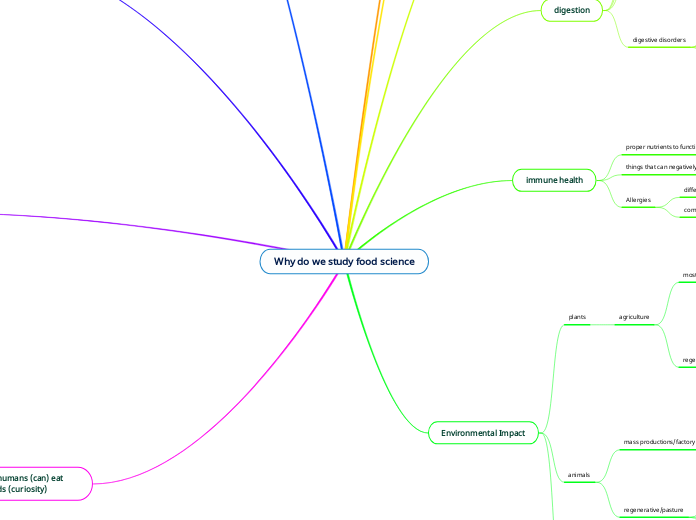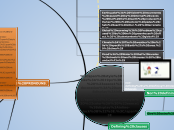Why do we study food science
Most animals have a diet, humans (can) eat the broadest range of foods (curiosity)
cooked
something like ceviche
heat(stove/oven/fire/etc.)
raw
Animals, bugs, nuts, seeds, legumes, spices, herbs, plants
different cuisines
Mental health
EPA (polyunsaturated fat) can be as effective as anti-depressants
Better sleep
how food affects sleep
Better functioning brain
what supports brain function
building blocks
fats/proteins
what hinders the function of brain
Food preparation
cooking
heat vs something like ceviche
some food is only safe/safer after preparation
different reasons / degrees
ripe fruits/ veges are generally safer then unripe ones
enzyme inhibitors/tanins/toxins
acorn more harmful then walnut
plant defenses (they can't really run away)
Most plants
Nuts/seeds
Legumes
Essentials (things we can't synthesize (enough of))
polyunsaturated fats
Minerals/elements
potassium, sodium, calcium, magnesiums, etc.
Vitamin C
Essential Amino acids
valine
tryptophan
threonine
phenylanine
methionine
lysine
leucine
isoleucine
histidine
Environmental Impact
organic vs. nonorganic
can destroy underground fungi
fungi also helps build soil health
helps sequester carbon
nonorganic is not good for bugs
bad for pollinates which are essential for the environment
organic usually has less yield
animals
regenerative/pasture
more humane
can help build topsoil
if done properly can help with crop growth
mass productions/factory farming
cruel/inhumane
feed comes from monocropping
huge releases of methane
plants
agriculture
regenerative/cover crops/no dig
good for environment
prevents erosion
helps build/sustain top soil
no huge release of carbon during harvest
sequesters carbon in the ground
most is monocropping
bad for environment
depletes top soil
in mass and nutrients
makes it less likely that the ground can sequester carbon
causes erosion when no crops are on them
huge releases of carbon during harvest
immune health
Allergies
common ones
eggs, nuts, peanuts
different severities
things that can negatively affect it
proper nutrients to function
vitamins/minerals/energy
digestion
digestive disorders
infections
stomach flu
food poisoning
lactose intolerence
IBD
IBS
not eating to much/often
water
fibre
Athletics
sweating/mineral depletion
Proper precursors
fats
used in membranes
myelin sheath in nervous system
proteins
muscle and membranes
minerals/vitamin
cholesterol
testosterone/estrogen/cortisol
Proper energy
Delay/ Prevent chronic/degenerative diseases
cancer
sarcopenia
Heart/circulatory diseases
Dementia
Energy
Calories
Ethanol
7 calories
Macronutrients
Proteins
Fats
9 calories
Saturated fats
steric acid/butter/coconut oil
Polyunsaturated fats
epa/dha/ala/arachodonic acid
Monounsaturated fats
oleic acid
Carbohydrates
4 calories
Simple carbohydrates
sugars
glucose
fructose
galactose
Complex carbohydrates









